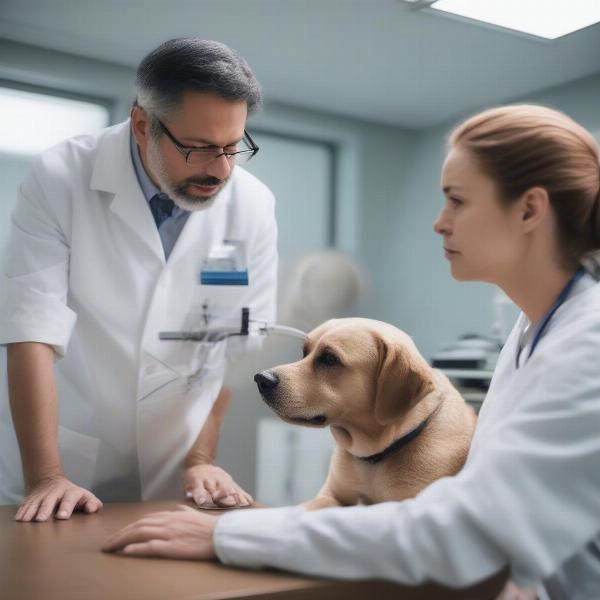Understanding dog surgeries can be a daunting task for any pet owner. From routine procedures like spaying and neutering to more complex operations, knowing what to expect can alleviate anxiety for both you and your furry friend. This guide aims to provide comprehensive information about various dog surgeries, covering pre-operative care, the procedures themselves, post-operative recovery, and potential complications.
Types of Dog Surgeries and Their Purposes
Several types of surgeries are commonly performed on dogs, ranging from elective procedures to emergency operations.
Spaying and Neutering
These are among the most common elective surgeries. Spaying (females) involves removing the ovaries and uterus, while neutering (males) involves removing the testicles. These procedures prevent unwanted pregnancies, reduce the risk of certain cancers, and can help manage behavioral issues.
Orthopedic Surgeries
These address problems with the musculoskeletal system. Common orthopedic surgeries include cruciate ligament repair, hip replacements, and fracture repairs. These procedures aim to restore mobility and alleviate pain caused by injuries or degenerative conditions.
Soft Tissue Surgeries
These involve organs within the body cavities, such as the abdomen or chest. Examples include tumor removal, gastrointestinal surgeries (like foreign body removal), and splenectomies.
Dental Surgeries
These procedures address dental health issues. Common dental surgeries include tooth extractions, periodontal surgery, and oral tumor removal.
Pre-Operative Care for Your Dog
Before any surgery, your veterinarian will conduct a thorough examination and may recommend blood tests and other diagnostic procedures to assess your dog’s overall health. You will receive instructions on fasting your dog before the surgery to prevent complications during anesthesia.
What to Expect on the Day of Surgery
Typically, you will drop your dog off at the veterinary clinic in the morning. The veterinary team will monitor your dog closely throughout the procedure and during recovery.
Post-Operative Care and Recovery
Post-operative care is crucial for successful healing. Your veterinarian will provide specific instructions regarding pain management, wound care, activity restriction, and follow-up appointments.
Managing Pain and Discomfort
Pain medications are typically prescribed to manage post-operative pain and discomfort. It’s crucial to follow your veterinarian’s instructions carefully regarding medication administration. dog surgery recovery suit
Monitoring for Complications
While most dog surgeries are successful, complications can occur. Be vigilant and contact your veterinarian immediately if you notice any signs of infection, excessive swelling, bleeding, or changes in your dog’s behavior. bitenot collar for dogs
The Cost of Dog Surgeries
The cost of dog surgeries varies depending on the complexity of the procedure, the geographic location, and the specific veterinary clinic. It’s essential to discuss costs with your veterinarian beforehand and explore pet insurance options. dog neurologist cost
 Veterinarian Discussing Surgery
Veterinarian Discussing Surgery
Conclusion
Dog surgeries, while sometimes necessary, can be stressful for both pets and their owners. Understanding the types of surgeries, pre- and post-operative care, and potential complications can help you make informed decisions and ensure the best possible outcome for your furry companion. Remember to always consult with your veterinarian for personalized advice and guidance.
FAQ
- How long does it take for a dog to recover from surgery? Recovery time varies depending on the type of surgery. It can range from a few days to several weeks.
- What are the signs of post-operative complications? Signs of complications include excessive bleeding, swelling, redness, discharge from the incision site, lethargy, loss of appetite, vomiting, and diarrhea.
- Can I give my dog over-the-counter pain medication? Never give your dog over-the-counter pain medication without consulting your veterinarian. Some human medications can be toxic to dogs.
- When can my dog resume normal activity after surgery? Follow your veterinarian’s instructions regarding activity restriction. Prematurely resuming normal activity can disrupt healing and lead to complications.
- What should I do if my dog licks the incision site? Licking can introduce bacteria and disrupt healing. Use an Elizabethan collar to prevent your dog from licking the incision.
- How can I prepare my home for my dog’s post-operative recovery? Create a quiet, comfortable, and clean recovery area for your dog. Restrict access to stairs and furniture to prevent jumping and straining the incision.
- What are the benefits of spaying or neutering my dog? Spaying or neutering can prevent unwanted pregnancies, reduce the risk of certain cancers, and help manage behavioral issues. thyforon dogs harness with weights for dogs
ILM Dog is a leading international online resource dedicated to providing expert advice and practical information on all aspects of dog care and wellbeing. From breed selection and health to training and nutrition, we’re here to help you navigate the journey of responsible dog ownership. Our expertise covers a wide range of topics including breed selection, health and medical care, training, nutrition, grooming, and product recommendations. For personalized guidance and expert advice, contact us at [email protected] or call us at +44 20-3965-8624. Visit ILM Dog for more information.